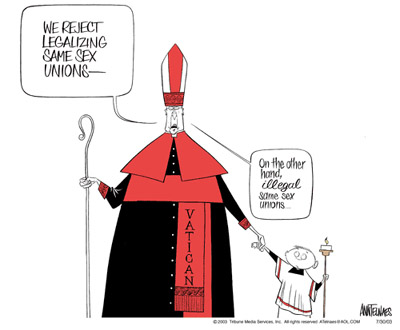
Well, the punchline is debatable in whether it is good, but it is there. This one isn't preachy at all.
In statistical analysis of experiments, you'll see two phrases crop up quite a bit. "Reject the null hypothesis" and "fail to reject the null hypothesis." If you reject the null hypothesis, then you have enough evidence to think that your hypothesis is true (with some margin of error). If you fail to reject it, then you do not have enough evidence from this experiment to think that your hypothesis is true (with some margin of error).
In very early labs for science classes you'll often conduct basic experiments where you "reject the null hypothesis." So here, we see the guy talking about how they "rejected the null hypothesis years ago," treating it as a static hypothesis across all experiments that can simply be refuted.
Well, the punchline is debatable in whether it is good, but it is there. This one isn't preachy at all.
In statistical analysis of experiments, you'll see two phrases crop up quite a bit. "Reject the null hypothesis" and "fail to reject the null hypothesis." If you reject the null hypothesis, then you have enough evidence to think that your hypothesis is true (with some margin of error). If you fail to reject it, then you do not have enough evidence from this experiment to think that your hypothesis is true (with some margin of error).
In very early labs for science classes you'll often conduct basic experiments where you "reject the null hypothesis." So here, we see the guy talking about how they "rejected the null hypothesis years ago," treating it as a static hypothesis across all experiments that can simply be refuted.
the Null Hypoithesis basically means you assume there's 'nothing interesting here': There's no conclusive evidence that the thing you're testing for does anything / pushes anything in the direction you want it to. You generally reject it when your data suggests results this odd (assuming the null hypothesis) are less than 5% likely (called '95% confidence level', 95% and 99% are common). This does NOT suggest your alternative hypothesis is 95% likely to be correct. It could be a fluke, it could depend on something completely different that is just correlated to (tends to occur at the same time as) the thing you're testing for.
The comic works in several ways: Highlighting common ignorance about terms very important to how technology/science move on; this should arguably be taught to everyone at school. A particular null hypothesis is rejected in any study that has an interesting result.
It could also be criticism of a perceived trend that threatens sound science: Big industries (and some political / religious groups) are accused of throwing money into big studies (statistics works best with big numbers of test cases, preferably you also want to test against expected sources of error... that's a lot of work, so bigger is better) until they have the results they want. The comic takes it one step further: A 'big study' has disproved the concept of the Null hypothesis and killed sound science as we know it.








